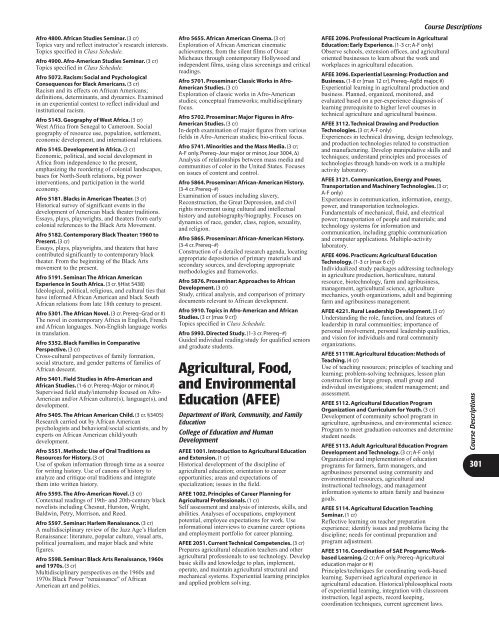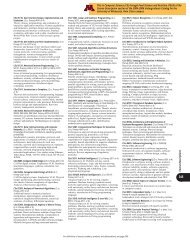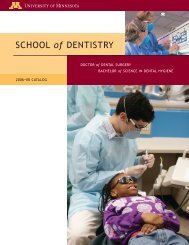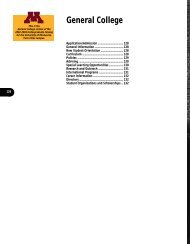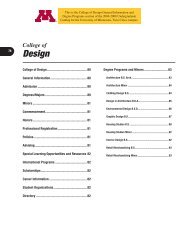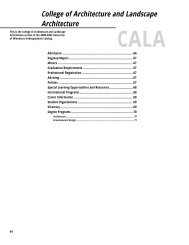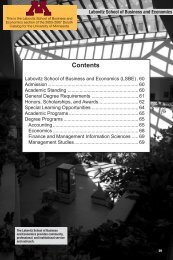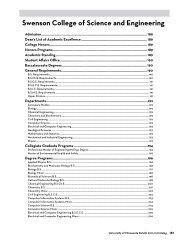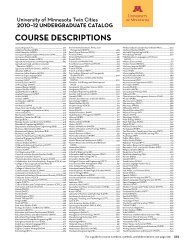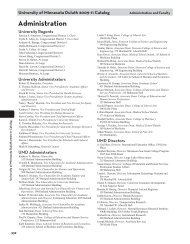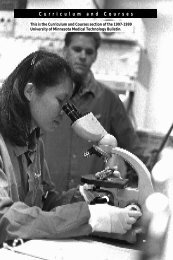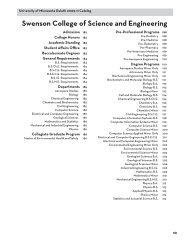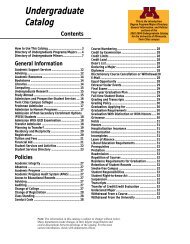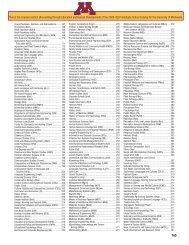CoursesâA through G and course numbers and symbols key
CoursesâA through G and course numbers and symbols key
CoursesâA through G and course numbers and symbols key
- No tags were found...
You also want an ePaper? Increase the reach of your titles
YUMPU automatically turns print PDFs into web optimized ePapers that Google loves.
Afro 4800. African Studies Seminar. (3 cr)Topics vary <strong>and</strong> reflect instructor’s research interests.Topics specified in Class Schedule.Afro 4900. Afro-American Studies Seminar. (3 cr)Topics specified in Class Schedule.Afro 5072. Racism: Social <strong>and</strong> PsychologicalConsequences for Black Americans. (3 cr)Racism <strong>and</strong> its effects on African Americans;definitions, determinants, <strong>and</strong> dynamics. Examinedin an experiential context to reflect individual <strong>and</strong>institutional racism.Afro 5143. Geography of West Africa. (3 cr)West Africa from Senegal to Cameroon. Socialgeography of resource use, population, settlement,economic development, <strong>and</strong> international relations.Afro 5145. Development in Africa. (3 cr)Economic, political, <strong>and</strong> social development inAfrica from independence to the present,emphasizing the reordering of colonial l<strong>and</strong>scapes,bases for North-South relations, big powerinterventions, <strong>and</strong> participation in the worldeconomy.Afro 5181. Blacks in American Theater. (3 cr)Historical survey of significant events in thedevelopment of American black theater traditions.Essays, plays, playwrights, <strong>and</strong> theaters from earlycolonial references to the Black Arts Movement.Afro 5182. Contemporary Black Theater: 1960 toPresent. (3 cr)Essays, plays, playwrights, <strong>and</strong> theaters that havecontributed significantly to contemporary blacktheater. From the beginning of the Black Artsmovement to the present.Afro 5191. Seminar: The African AmericanExperience in South Africa. (3 cr. §Hist 5438)Ideological, political, religious, <strong>and</strong> cultural ties thathave informed African American <strong>and</strong> black SouthAfrican relations from late 18th century to present.Afro 5301. The African Novel. (3 cr. Prereq–Grad or #)The novel in contemporary Africa in English, French<strong>and</strong> African languages. Non-English language worksin translation.Afro 5352. Black Families in ComparativePerspective. (3 cr)Cross-cultural perspectives of family formation,social structure, <strong>and</strong> gender patterns of families ofAfrican descent.Afro 5401. Field Studies in Afro-American <strong>and</strong>African Studies. (1-6 cr. Prereq–Major or minor, #)Supervised field study/internship focused on Afro-American <strong>and</strong>/or African culture(s), language(s), <strong>and</strong>development.Afro 5405. The African American Child. (3 cr. §3405)Research carried out by African Americanpsychologists <strong>and</strong> behavioral/social scientists, <strong>and</strong> byexperts on African American child/youthdevelopment.Afro 5551. Methods: Use of Oral Traditions asResources for History. (3 cr)Use of spoken information <strong>through</strong> time as a sourcefor writing history. Use of canons of history toanalyze <strong>and</strong> critique oral traditions <strong>and</strong> integratethem into written history.Afro 5593. The Afro-American Novel. (3 cr)Contextual readings of 19th- <strong>and</strong> 20th-century blacknovelists including Chesnut, Hurston, Wright,Baldwin, Petry, Morrison, <strong>and</strong> Reed.Afro 5597. Seminar: Harlem Renaissance. (3 cr)A multidisciplinary review of the Jazz Age’s HarlemRenaissance: literature, popular culture, visual arts,political journalism, <strong>and</strong> major black <strong>and</strong> whitefigures.Afro 5598. Seminar: Black Arts Renaissance, 1960s<strong>and</strong> 1970s. (3 cr)Multidisciplinary perspectives on the 1960s <strong>and</strong>1970s Black Power “renaissance” of AfricanAmerican art <strong>and</strong> politics.Afro 5655. African American Cinema. (3 cr)Exploration of African American cinematicachievements, from the silent films of OscarMicheaux <strong>through</strong> contemporary Hollywood <strong>and</strong>independent films, using class screenings <strong>and</strong> criticalreadings.Afro 5701. Proseminar: Classic Works in Afro-American Studies. (3 cr)Exploration of classic works in Afro-Americanstudies; conceptual frameworks; multidisciplinaryfocus.Afro 5702. Proseminar: Major Figures in Afro-American Studies. (3 cr)In-depth examination of major figures from variousfields in Afro-American studies; bio-critical focus.Afro 5741. Minorities <strong>and</strong> the Mass Media. (3 cr;A-F only. Prereq–Jour major or minor, Jour 3004, ∆)Analysis of relationships between mass media <strong>and</strong>communities of color in the United States. Focuseson issues of content <strong>and</strong> control.Afro 5864. Proseminar: African-American History.(3-4 cr. Prereq–#)Examination of issues including slavery,Reconstruction, the Great Depression, <strong>and</strong> civilrights movement using cultural <strong>and</strong> intellectualhistory <strong>and</strong> autobiography/biography. Focuses ondynamics of race, gender, class, region, sexuality,<strong>and</strong> religion.Afro 5865. Proseminar: African-American History.(3-4 cr. Prereq–#)Construction of a detailed research agenda, locatingappropriate depositories of primary materials <strong>and</strong>secondary sources, <strong>and</strong> developing appropriatemethodologies <strong>and</strong> frameworks.Afro 5876. Proseminar: Approaches to AfricanDevelopment. (3 cr)Study, critical analysis, <strong>and</strong> comparison of primarydocuments relevant to African development.Afro 5910. Topics in Afro-American <strong>and</strong> AfricanStudies. (3 cr [max 9 cr])Topics specified in Class Schedule.Afro 5993. Directed Study. (1-3 cr. Prereq–#)Guided individual reading/study for qualified seniors<strong>and</strong> graduate students.Agricultural, Food,<strong>and</strong> EnvironmentalEducation (AFEE)Department of Work, Community, <strong>and</strong> FamilyEducationCollege of Education <strong>and</strong> HumanDevelopmentAFEE 1001. Introduction to Agricultural Education<strong>and</strong> Extension. (1 cr)Historical development of the discipline ofagricultural education; orientation to careeropportunities; areas <strong>and</strong> expectations ofspecialization; issues in the field.AFEE 1002. Principles of Career Planning forAgricultural Professionals. (1 cr)Self assessment <strong>and</strong> analysis of interests, skills, <strong>and</strong>abilities. Analyses of occupations, employmentpotential, employee expectations for work. Useinformational interviews to examine career options<strong>and</strong> employment portfolio for career planning.AFEE 2051. Current Technical Competencies. (3 cr)Prepares agricultural education teachers <strong>and</strong> otheragricultural professionals to use technology. Developbasic skills <strong>and</strong> knowledge to plan, implement,operate, <strong>and</strong> maintain agricultural structural <strong>and</strong>mechanical systems. Experiential learning principles<strong>and</strong> applied problem solving.AFEE 2096. Professional Practicum in AgriculturalEducation: Early Experience. (1-3 cr; A-F only)Observe schools, extension offices, <strong>and</strong> agriculturaloriented businesses to learn about the work <strong>and</strong>workplaces in agricultural education.Course DescriptionsAFEE 3096. Experiential Learning: Production <strong>and</strong>Business. (1-8 cr [max 12 cr]. Prereq–AgEd major, #)Experiential learning in agricultural production <strong>and</strong>business. Planned, organized, monitored, <strong>and</strong>evaluated based on a per-experience diagnosis oflearning prerequisite to higher level <strong>course</strong>s intechnical agriculture <strong>and</strong> agricultural business.AFEE 3112. Technical Drawing <strong>and</strong> ProductionTechnologies. (3 cr; A-F only)Experiences in technical drawing, design technology,<strong>and</strong> production technologies related to construction<strong>and</strong> manufacturing. Develop manipulative skills <strong>and</strong>techniques; underst<strong>and</strong> principles <strong>and</strong> processes oftechnologies <strong>through</strong> h<strong>and</strong>s-on work in a multipleactivity laboratory.AFEE 3121. Communication, Energy <strong>and</strong> Power,Transportation <strong>and</strong> Machinery Technologies. (3 cr;A-F only)Experiences in communication, information, energy,power, <strong>and</strong> transportation technologies.Fundamentals of mechanical, fluid, <strong>and</strong> electricalpower; transportation of people <strong>and</strong> materials; <strong>and</strong>technology systems for information <strong>and</strong>communication, including graphic communication<strong>and</strong> computer applications. Multiple-activitylaboratory.AFEE 4096. Practicum: Agricultural EducationTechnology. (1-3 cr [max 6 cr])Individualized study packages addressing technologyin agriculture production, horticulture, naturalresource, biotechnology, farm <strong>and</strong> agribusiness,management, agricultural science, agriculturemechanics, youth organizations, adult <strong>and</strong> beginningfarm <strong>and</strong> agribusiness management.AFEE 4221. Rural Leadership Development. (3 cr)Underst<strong>and</strong>ing the role, function, <strong>and</strong> features ofleadership in rural communities; importance ofpersonal involvement, personal leadership qualities,<strong>and</strong> vision for individuals <strong>and</strong> rural communityorganizations.AFEE 5111W. Agricultural Education: Methods ofTeaching. (4 cr)Use of teaching resources; principles of teaching <strong>and</strong>learning; problem-solving techniques, lesson planconstruction for large group, small group <strong>and</strong>individual investigations; student management; <strong>and</strong>assessment.AFEE 5112. Agricultural Education ProgramOrganization <strong>and</strong> Curriculum for Youth. (3 cr)Development of community school program inagriculture, agribusiness, <strong>and</strong> environmental science.Program to meet graduation outcomes <strong>and</strong> determinestudent needs.AFEE 5113. Adult Agricultural Education ProgramDevelopment <strong>and</strong> Technology. (3 cr; A-F only)Organization <strong>and</strong> implementation of educationprograms for farmers, farm managers, <strong>and</strong>agribusiness personnel using community <strong>and</strong>environmental resources, agricultural <strong>and</strong>instructional technology, <strong>and</strong> managementinformation systems to attain family <strong>and</strong> businessgoals.AFEE 5114. Agricultural Education TeachingSeminar. (1 cr)Reflective learning on teacher preparationexperience; identify issues <strong>and</strong> problems facing thediscipline; needs for continual preparation <strong>and</strong>program adjustment.AFEE 5116. Coordination of SAE Programs: WorkbasedLearning. (2 cr; A-F only. Prereq–Agriculturaleducation major or #)Principles/techniques for coordinating work-basedlearning. Supervised agricultural experience inagricultural education. Historical/philosophical rootsof experiential learning, integration with classroominstruction, legal aspects, record keeping,coordination techniques, current agreement laws.Course Descriptions301


